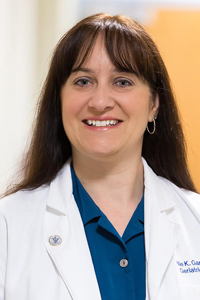ST. LOUIS -- While taking nutritional supplements helps older adults in the general population gain weight, they don't necessarily live longer or function better than those who don't take supplements, according to a research review article by Saint Louis University geriatricians.
 Julie Gammack, M.D.Photo courtesy of Saint Louis UniversityHowever, supplements improve the ability of those who are malnourished or frail to function and help them live longer.
Julie Gammack, M.D.Photo courtesy of Saint Louis UniversityHowever, supplements improve the ability of those who are malnourished or frail to function and help them live longer.
Nutrition supplements are beverages such as Ensure or Boost that contain vitamins, minerals, proteins and calories and frequently are taken between meals, in addition to traditional foods.
Malnutrition in the elderly is a significant problem, affecting up to 15 percent of those in long-term care facilities, says Julie Gammack, M.D., professor of geriatrics and lead author of the article that was published early this year inCurrent Opinion in Clinical Nutrition and Metabolic Care.
"Malnutrition and weight loss are common and have serious consequence for older adults. It's often under-recognized in the elderly population and its consequences can be devastating," said Gammack, who also is a SLUCare Physician Group geriatrician.
"People lose strength and their ability to function independently, which puts them at risk of increased hospitalizations and their overall quality of life deteriorates. Oral nutritional supplements have shown benefits for those who are malnourished or frail."
Long a leader in geriatric care, SLU recently received a $2.5 million, three-year federal grant to improve care for older Missourians. Read about it here.
Established in 1836, Saint Louis University School of Medicine has the distinction of awarding the first medical degree west of the Mississippi River. The school educates physicians and biomedical scientists, conducts medical research, and provides health care on a local, national and international level. Research at the school seeks new cures and treatments in five key areas: infectious disease, liver disease, cancer, heart/lung disease, and aging and brain disorders.













